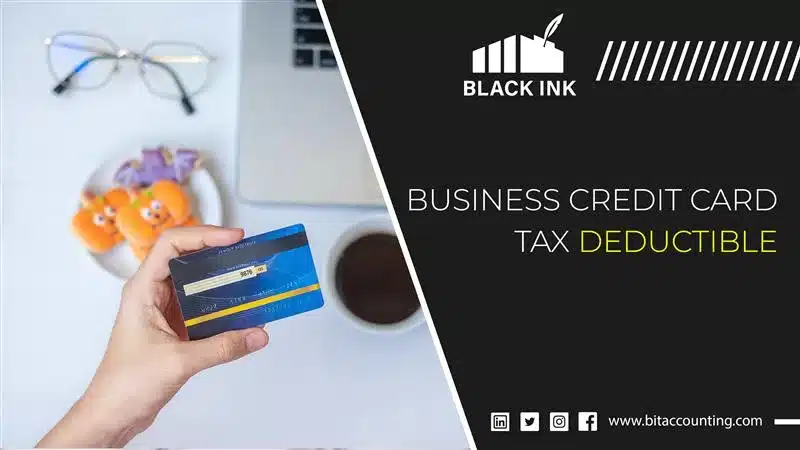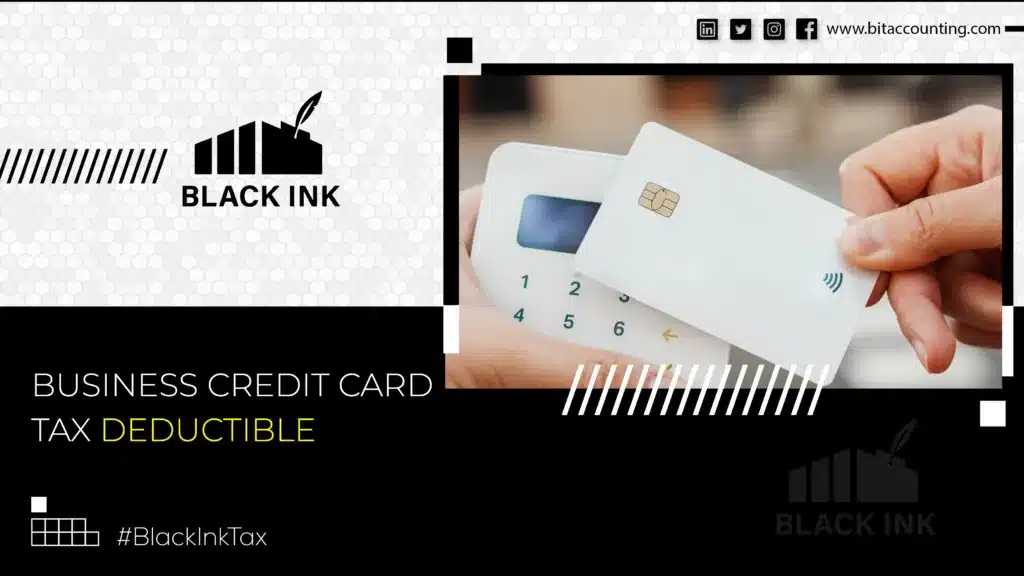
Table of Contents
Are Business Credit Card Tax Deductible?
When you run a business, keeping track of every dollar matters, especially at tax time. One area that many business owners overlook is whether they can deduct expenses related to their business credit cards. Understanding what’s tax-deductible can help you save money and avoid problems with the IRS (Internal Revenue Service).
In this post, we’ll answer a common question: Are business credit card fees and interest tax-deductible? We’ll explain what you can and can’t deduct, what rules you need to follow, and how to stay organized to make tax season easier. By the end, you’ll know how to handle these expenses the smart way.
What Business Credit Card Expenses Are Tax Deductible?
The IRS allows you to deduct many business expenses if they are considered “ordinary and necessary.” This simply means the expense is common in your line of work and useful to running your business.
Let’s look at some examples of what business credit card expenses you can deduct:
Ordinary and Necessary Business Expenses
The IRS provides guidelines for expenses that are both needed and usual for your business. Here are some examples:
- Office supplies (paper, printer ink, pens)
- Business travel (flights, hotels, taxis)
- Equipment (computers, tools, machinery)
- Marketing (ads, business cards, website costs)
If you paid for these items using a business credit card, the cost is tax-deductible, including any interest expense tied to those purchases.
Deductible Credit Card Fees
Some fees charged by your credit card company are also deductible if they are directly related to your business. These include:
- Annual fees: If your business card charges a yearly fee, you can write it off.
- Transaction fees: These happen when you buy something in a foreign currency or use certain payment services.
- Late payment fees: Only deductible if they’re from business-related purchases—not personal ones.
Employee Expense Reimbursements
If your employees use their own money for business purposes and you pay them back, those expenses can be deducted. Just make sure you collect documentation, such as receipts or reports, to prove the purchase was for business. Keeping good records helps protect you in case of an audit.
What Business Credit Card Expenses Are Not Deductible?
Not everything charged to a credit card can be claimed on your taxes. Here’s what you can’t deduct:
Personal Expenses
Any purchase that isn’t for business can’t be claimed. This includes:
- Family vacations
- Grocery shopping for home
- Personal clothing
- Entertainment unrelated to work
Even if you used your business credit card, these do not qualify as business expenses. Mixing personal and business spending—called commingling funds—can get you in trouble with the IRS.
Non-Qualifying Fees
Some fees just aren’t allowed, especially if they don’t help your business in any way. Examples include:
- Cash advance fees (especially if used for personal reasons)
- Late fees from personal purchases
Personal Credit Card Interest
After the Tax Cuts and Jobs Act of 2018, interest expense on personal credit cards is no longer tax-deductible. Even if the purchase was for your business, if you used a personal card, you can’t claim the interest.
IRS Rules for Claiming Business Credit Card Deductions
To stay on the safe side and avoid penalties, follow the IRS rules closely.
Documentation Requirements
Always keep:
- Receipts
- Invoices
- Bank or credit card statements
Use separate credit cards for your business and personal spending. This makes tracking easier and avoids commingling funds, which can confuse your records and raise red flags in case of an audit.

Ordinary vs. Necessary
As mentioned before, expenses must be:
- Ordinary: Common for your type of work.
- Necessary: Helpful to operate or grow your business.
The IRS looks for both when reviewing your tax-deductible claims.
Form Schedule C
If you’re a sole proprietor or a freelancer, you’ll report your business expenses using Schedule C (Profit or Loss from Business). This form is where you list costs, including credit card interest, fees, and other write-offs.
How to Claim Business Credit Card Tax Deductions
Being organized is the key to making sure you get all the deductions you deserve.
Track Expenses
Use accounting tools or mobile apps to sort your spending. Set categories like:
- Office supplies
- Travel
- Meals
- Equipment
This makes it easy to see what’s deductible.
Review Statements
Every month, check your credit card statements. Highlight the business-related charges and note the purpose of each.
Consult a Tax Professional
When in doubt, speak to a tax professional. They can help you make sure your records follow IRS rules, guide you through Schedule C, and make sure you’re claiming everything you’re entitled to.
Common Mistakes to Avoid
Here are a few traps that many business owners fall into:
Commingling Funds
Don’t mix personal and business spending on one card. It makes your records messy and can hurt your case if you get audited.
Overlooking Rewards
Credit card rewards like cash back or points aren’t taxable income. However, if you use rewards to buy business items, the purchase amount might not be deductible. Talk to your accountant about how to treat these correctly.
Ignoring Interest Limits
If your business runs on credit and carries high balances, the IRS may take a closer look. Keep your credit use smart and within limits to avoid unwanted attention.
Conclusion
So, are business credit card fees and interest tax-deductible? The answer is yes—if the expenses are for your business and you keep good records. With proper documentation, smart tracking, and the help of a trusted tax professional, you can deduct many charges from your taxes and reduce your overall bill.
Make sure your business expenses are clearly marked, avoid commingling funds, and stay up to date with IRS rules. Taking the time to get organized now will help you avoid stress—and maybe even save money—when tax season rolls around.
FAQs
1: Are all business credit card fees tax-deductible?
Not all fees are deductible. You can usually deduct annual fees, transaction fees, and late fees if they’re tied to business expenses. Fees from personal spending don’t qualify.
2: Can I deduct interest on my business credit card?
Yes, interest expense on business-related purchases is tax-deductible. Just make sure the interest comes from business use, not personal use.
3: What happens if I use one credit card for both business and personal expenses?
This is called commingling funds, and it can cause problems. The IRS (Internal Revenue Service) may question your deductions or deny them if it’s not clear which charges are for business.
4: Can I deduct business expenses made with a personal credit card?
Yes, but it’s risky. You must have clear documentation, and only the business expenses (not the interest) can be deducted. Using a dedicated business card is better.
5: Do I need to keep receipts for every purchase?
Yes, the IRS expects you to keep records like receipts, invoices, and credit card statements. This helps you in case of an audit and supports your claims on Schedule C.
6: Are credit card rewards taxable or deductible?
Credit card rewards like points or cash back aren’t taxable income. However, if you use them for business purchases, those purchases might not be tax-deductible. Talk to a tax professional for guidance.
7: Should I hire a tax professional to handle my credit card deductions?
It’s a smart move. A tax professional can help you follow IRS rules, avoid common mistakes, and get the most out of your deductions without raising red flags.
Get a Free Quote Today For All of Our Services
Fill out the form below and we will send you a free analysis of your current state and what would be the cost of managing either a separate accounting and bookkeeping services or a complete solution across South Carolina, USA. Do get in touch and we will be happy to consult you with our bookkeeping services in SC, South Carolina, USA.
GET FREE QUOTE FOR ALL OF OUR SERVICES
CharlestonTaxcity will send you a free analysis of your current state and what would be the cost of managing either a separate accounting and bookkeeping services or a complete solution across South Carolina, USA. Do get in touch and we will be happy to consult you with our bookkeeping services in SC, South Carolina, USA.

